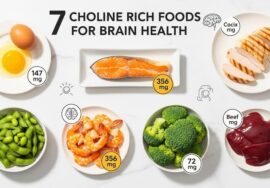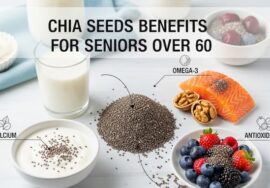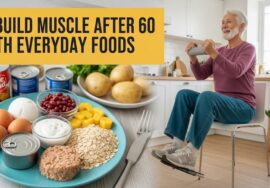Breakfast sets the tone for the day, but for many older adults, it’s also the meal where the most mistakes happen. Some of these habits may seem harmless — skipping a meal, having only coffee, or eating the same thing every morning — yet over time, they can affect energy levels, digestion, and even bone strength. Changing a few breakfast routines can make mornings healthier and more enjoyable.
Table of Contents
- Why Morning Meals Matter More as We Age
- Skipping Breakfast Completely
- Having Only Coffee or Tea
- Relying on White Bread and Sugary Foods
- Ignoring Protein in the Morning
- Eating Too Little Fiber
- Eating Processed Meats Too Often
- Forgetting to Drink Water
- Eating Too Quickly
- Neglecting Calcium-Rich Foods
- Eating the Same Meal Every Day
- Quick Fixes for a Healthier Breakfast
- Why Fixing Breakfast Habits Matters
- FAQs – Quick Answers for Seniors and Caregivers
Why Morning Meals Matter More as We Age
As we grow older, the body doesn’t process food the way it used to. Muscles need more protein to stay strong, digestion slows, and the risk of blood sugar spikes goes up. A poorly balanced breakfast can make seniors feel tired halfway through the morning or even lead to long-term nutrient deficiencies. The good news is that simple changes can fix most of these problems.
1. Skipping Breakfast Completely
Many seniors think skipping breakfast saves calories, but it often does more harm than good. Going too long without eating lowers energy, weakens muscles, and can leave you lightheaded by midday. Even something small — a slice of whole-grain toast with peanut butter or a boiled egg with fruit — is better than nothing.
2. Having Only Coffee or Tea
A cup of coffee or tea may feel enough, especially for people who aren’t hungry early in the morning. But drinking caffeine on an empty stomach can cause heartburn, upset digestion, or trigger energy crashes later. A handful of nuts, yogurt, or a slice of cheese with your coffee makes a big difference.
3. Relying on White Bread and Sugary Foods
White toast, sweet muffins, and packaged cereals are easy, but they’re also among the worst choices for older adults. These foods give a quick rush of energy followed by a slump, leaving you sluggish before lunch. Switching to oats, multigrain bread, or bran cereal keeps blood sugar steady and adds valuable fiber.
4. Ignoring Protein in the Morning
Older adults naturally lose muscle mass with age, and skipping protein at breakfast only speeds that up. Eggs, cottage cheese, Greek yogurt, or even a small serving of beans are excellent options. Pairing protein with healthy carbs gives longer-lasting energy.
5. Eating Too Little Fiber
Constipation is a common complaint in elderly age, and a low-fiber breakfast doesn’t help. Adding fruit, chia seeds, or flaxseed to your morning meal supports better digestion. Even a simple apple with almond butter adds both fiber and healthy fats.
6. Eating Processed Meats Too Often
Bacon, sausages, and ham might taste great, but they’re high in salt and can raise blood pressure if eaten regularly. Save them for occasional treats and lean toward eggs, nuts, or fish instead.
7. Forgetting to Drink Water
Many older adults wake up slightly dehydrated, which can cause headaches and fatigue. Starting the day with a glass of water or herbal tea before breakfast helps the body wake up and supports digestion.
8. Eating Too Quickly
Some seniors eat in a hurry out of habit. But gulping down breakfast makes indigestion more likely and can leave you feeling bloated. Slowing down, chewing well, and enjoying your meal helps the body absorb nutrients better.
9. Neglecting Calcium-Rich Foods
Strong bones need daily calcium, especially after 50. Adding milk, yogurt, or fortified plant-based options at breakfast is an easy way to meet your daily needs. A sprinkle of cheese on eggs or chia seeds in oatmeal also works well.
10. Eating the Same Meal Every Day
Many seniors fall into the habit of eating the same breakfast for years. While routines are comforting, they can also mean missing out on important nutrients. Rotating between eggs, oatmeal, smoothies, or vegetable omelets adds variety and more vitamins to your diet.
Quick Fixes for a Healthier Breakfast
- Combine protein and fiber — for example, eggs with spinach or oatmeal with nuts.
- Add a portion of fruit or vegetables for natural vitamins.
- Keep healthy snacks ready for mornings when you don’t feel like cooking.
- Drink water or herbal tea before coffee to stay hydrated.
Why Fixing Breakfast Habits Matters
Poor breakfast choices can cause more than just low energy. Weak muscles, poor digestion, higher fall risk, and bone problems often start with everyday habits. Adjusting breakfast is one of the easiest ways to improve overall health and keep independence longer.
FAQs – Quick Answers for Seniors and Caregivers
1. Should older adults eat breakfast daily?
Yes, eating something in the morning helps maintain energy and mental focus.
2. Can coffee be bad on an empty stomach?
It can cause acid reflux or discomfort if no food is eaten with it.
3. What’s a quick healthy breakfast for seniors?
A boiled egg with whole-grain toast or Greek yogurt with nuts works well.
4. Does skipping breakfast affect muscle strength?
Yes, long gaps without food may speed up muscle loss in older adults.
5. Are packaged cereals okay?
Choose high-fiber, low-sugar cereals instead of sugary brands.
6. Should seniors eat protein in the morning?
Yes, at least one protein-rich food at breakfast helps preserve muscle mass.
7. Is fruit alone enough for breakfast?
It’s better combined with protein or healthy fats for steady energy.
8. Does milk help bone health at breakfast?
Yes, milk, yogurt, or fortified alternatives add essential calcium.
9. Can smoothies be a good breakfast?
Yes, if made with natural ingredients and not loaded with sugar.
10. How can older adults prevent constipation in the morning?
Include fiber-rich foods and drink enough water daily.








